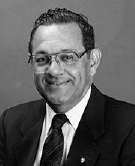Wiley A. Branton/Howard Law Journal Symposium
WILEY A. BRANTON SYMPOSIUM
Each year, Howard University School of Law and the Howard Law Journal pay tribute to the life and legacy of our former Dean and civil rights activist, the late Wiley A. Branton. Since the Symposium’s inception, it has been the source of thought-provoking scholarly articles. What began as a scholarship award ceremony for the first-year student who completed the year with the highest grade point average has grown into a day-long program that focuses on an area of legal significance inspired by Mr.Branton’s career as a prominent civil rights activist and exceptional litigator. The Spring issue of every volume is dedicated to the Symposium.
2025 Symposium — October 23, 2025
We're excited to announce the topic for our 22nd Annual Wiley A. Branton Symposium: Good Trouble: Unleashing Power, Policy, and the Voice of the People in Education. Inspired by the legacies of both Wiley A. Branton and Congressman John Lewis, this theme invites a dialogue on what it means to get into “good trouble” in the pursuit of justice within the field of education. On this day, we will explore how social engineers have historically challenged oppressive educational systems—and how that spirit of resistance continues today through advocacy, policy, and movement-building. Additional details to come, however, for now, please mark your calendars for Thursday, October 23, 2025!
Wiley A. Branton Biography
A prominent attorney and noted civil rights activist, Wiley Austin Branton was a strong advocate of voting rights for all Americans. Born in Pine Bluff, Arkansas on December 13, 1923, he received his elementary, junior high, and high school education in Pine Bluff schools.
An Army veteran of World War II, Branton spent time during the post-war period teaching blacks how to mark an election ballot. His efforts resulted in his being convicted of a misdemeanor for “teaching the mechanics of voting.” Branton attended Arkansas A.M. & N. College (now the University of Arkansas at Pine Bluff) where he received the Bachelor of Science degree in Business Administration in 1950. He received his law degree in 1952 from the University of Arkansas School of Law at Fayetteville.
Branton achieved national prominence when he served as the chief counsel for the Black plaintiffs in the 1957 Little Rock Desegregation Case. However, during his long distinguished legal career, he made significant contributions in the voting rights arena as both a public officer and private citizen. In 1962, the major American civil rights leaders, which included Roy Wilkins, Dr. Martin Luther King, Jr., and Whitney Young, Jr., unanimously approved the selection of Branton as the first executive director of the Southern Regional Council’s Voter Education Project, based in Atlanta, Georgia. The Project was a cooperative effort that successfully registered over 600,000 Black voters in eleven states and helped create the momentum for the 1965 Voting Rights Act.
In 1965, Branton moved to Washington where he was appointed by Vice President Hubert H. Humphrey as the executive secretary to President Lyndon B. Johnson’s Council on Equal Opportunity. As a chief aide to Humphrey and Johnson, Branton traveled throughout the South encouraging Blacks to register under the 1965 Voting Rights Act. From 1972 to 1974, Branton served as head of the Voter Registration Fund, a non-partisan organization created to provide funding to tax exempt organizations in support of voter registration activities.
Wiley Austin Branton served as dean of the Howard University School of Law from January 1, 1978 to September 2, 1983.
Past Symposia
The expansive nature of Mr. Branton’s work has allowed the Journal to span a wide range of topics throughout the years.
2024- The 21st Century Social Engineer: Crafting the Future of the 14th Amendment
2023- Capital Punishment
2022 - Immigration Equality
2021 - Health Equity: Developments & Challenges of the COVID-19 Pandemic
2020 - An Environment of Justice: Developments & Challenges in Environmental Law
2019 - The Next 150: Shaping a Civil Rights Agenda for the 21st Century
2018 - Internal and External Challenges to the American Electoral Process
2017 - Speaking Truth to Power: A New Age of First Amendment Rights?
2016 - President Obama's Legacy in the Courts: Executive Power and the Federal Judiciary
2015 - Reforming the Criminal inJustice System
2014 - Rights vs. Control: America's Perennial Debate on Guns
2013 - Civil Rights at a Critical Juncture: Confronting Old Conflicts and New Challenges
2012 - Protest & Polarization: Law and Debate in America 2012
2011 - Health Care Reform and Vulnerable Communities: Can We Afford It? Can We Afford to Live Without It?
2010 - Collateral Consequences: Who Really Pays the Price for Criminal “Justice”?
2009 - From Reconstruction to the White House: The Past and Future of Black Lawyers in America
2008 - Thurgood Marshall: His Life, His Work, His Legacy
2007 - Hurricane Katrina and the Rule of Law in a Time of Crisis
2006 - “What is Black?”: Perspectives on Interracial Coalition Building in the Modern Civil Rights Movement
2005 - The Value of the Vote: The 1965 Voting Rights Act and Beyond
2004 - Unfinished Work of the Civil Rights Act of 1964: Shaping an Agenda for the Next 40 Years
Past Keynote Speakers
Past keynote speakers have included Congresswoman Donna M. Christensen, of the U.S. Virgin Islands; Professor of Law and former Solicitor General Drew Days; the Honorable Sarah S. Vance, of the U.S. District Court, Eastern District of Louisiana; Professor Tomiko Nagin-Brown, of Harvard Law School; former New York County District Attorney, Cyrus R. Vance, Jr.; State’s Attorney Angela D. Alsobrooks, of Prince George’s County; Marc H. Morial, the President and CEO of the National Urban League; Honorable Carlton W. Reeves, of the United States District Court for the Southern District of Mississippi and Chair of the United States Sentencing Commission; and most recently Janai Nelson, President and Director-Counsel of the NAACP Legal Defense Fund.

